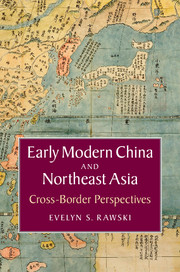Epilogue: drawing boundaries in northeast Asia
Published online by Cambridge University Press: 05 June 2015
Summary
By shaping contemporary academic and popular understanding of China's historical relations with northeast Asia, the national histories of the twentieth century continue to affect China's relations with Korea and Japan. This chapter begins with a survey of the introduction into Asia of a European model of “scientific history,” its subordination to the demands of nation-building, and the interstate quarrels that the new national history provoked. Throughout the twentieth century, national history remained the dominant framework within which history was written and taught. The new history served the political need to legitimate and explain “the nation-state in its present expanding form.” In Asia as in Europe, historians served the nation not only in inculcating nationalism– developing loyalty to the state as the citizens' preeminent obligation and primary identity – but in fulfilling the government's need for specialized language and regional knowledge in articulating and legitimating the foreign policy agenda. Inverting the sequence that prevailed in the pre-modern era, new knowledge appeared first in Japan, then several decades later in China, and finally after 1945 in Korea.
The new national histories and Japan's imperial expansion raised issues of historical “ownership” of northeast Asia. As Japanese scholars created a history that extended beyond contemporary boundaries, Korean and Chinese historians responded with their own counter narratives. Despite the changing geopolitics of the post-1945 period, the nationalist-inspired controversies have persisted and continue to create political tensions.
The fall-out in 2004 from conflicting claims for international recognition of the northeast Asian kingdom of Gaogouli/Koguryŏ illustrates the ways in which national history caused international wrangles with neighboring states. The Chinese–Korean struggle over historical ownership of Gaogouli/Koguryŏ, a northeast Asian state that existed in ancient times (first century BCE – 668 CE) serves as a good example of the repercussions surrounding the PRC leadership's moves to shore up its control over territories that were acquired by the Qing empire, but it also introduces us to the broader ongoing debate among scholars on how concepts of the nation could be applied to antiquity, an issue of particular relevance to China's multi-ethnic citizenry and germane to a fundamental issue, the role of China's minority nationalities in the writing of national history.
- Type
- Chapter
- Information
- Early Modern China and Northeast AsiaCross-Border Perspectives, pp. 235 - 263Publisher: Cambridge University PressPrint publication year: 2015



